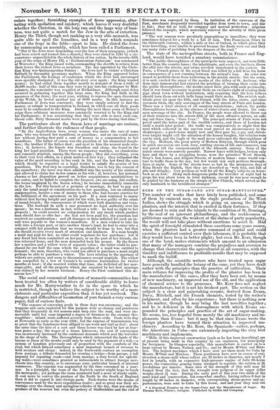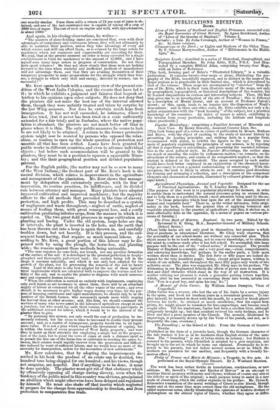KERR ON THE SUGAR-CANE AND SUGAR-MANUFACTURE. * THE number of works
that have lately been published, and some of them by eminent men, on the staple production of the West Indies, shows the struggle which is going on among the British planters, and the interest that is excited in their fortunes. If they are doomed to ruin and the islands to the condition of St. Domingo, by the zeal of an ignorant philanthropy, and the recklessness of politicians sacrificing the weakest at the shrine of party popularity the result will not take place without exertions to avert it. Had the spirit of foresight stimulated these exertions some years sooner, when the planters had a greater command of capital and could exercise a sufficient control over their labourers, it is probable that they would have been in better plight; but even Mr. Kerr, though one of the band, makes statements which amount to an admission that many of the managers combine the prejudices and aversion to change that characterize the agriculturist in all countries, with the timidity and indifference to profitable results that may be supposed to mark the bailiff.
Although the scientific writers who have treated upon sugar have generally handled the botany of the cane, yet they have dealt rather with the principles than the practice of cultivation. Their main reliance for improving the profits of the planter has been in the manufacture of the canes, after they have been cut, by means of new machinery, an improved use of the old, and the application of chemical science to the processes. Mr. Kerr does not neglect the manufacture, but it is not his freshest part. The section on the subject is a clear and painstaking resume, derived from Evans, Davy, Mitchell, and the French chemists, tested by the writer's judgment, and often by his experience ; but there is nothing new in his matter, though he may bring the last novelties together ; and he is deficient in the thoroughness with which Evans expounded the principles and practice of the art of sugar-making. He seems, too, less hopeful from merely the old machinery and implements than Evans : but it may be that since Evans wrote the foreign planters have turned their attention to improved machinery. According to Mr. Kerr, the Spaniards—rather, perhaps, the Americans in Cuba—are extensively importing the very best machinery and implements. "Mills of this improved construction [such as he has been describing] are at present being made in this country by our engineers, but principally for foreigners. In Glasgow especially., this manufacture is carried on to a large extent by Messrs. Neilson and Co., and by Messrs. WOnie and Mirrlees. The largest machines which I have seen are those made for Cuba by Messrs. M‘Onie and Mirrlees. These gentlemen have now in course of construction a steam-mill whose rollers are 32 inches in diameter, and nearly 7 feet in length, with an expansive high-pressure engine of fully 60-horse power, the connecting gearing being arranged to regulate the motion at at revolutions per minute. Some idea of the strength of this mill may be formed from the fact, that the wrought iron gudgeon of its upper roller weighs about n tons. During the early part of this year two mills of the same kind and construction, but somewhat smaller, having rollers 6 feet in length by 30 inches in diameter, with corresponding' steam-power and appurtenances, were sent to Cuba 'by this house, and last year they sent out
• A Practical Treatise on the Sugar-Cane and the Manufacture of Sugar. By Thomas Kerr, Planter, Antigua. Published by Griffin and Company.
-one exactly similar. Fvom these mills a return of 72 per cent of juieeie obtained, and one of the bat-mentioned size is capable of taking off a crop of 2000 tons of sugar. The omit of such an engine and mill, with appurtenances, is about 23001."
And again, in his closing observations, he writes— "The plters of slave-holding states are convinced that, even with their advantages of compulsory and continuous labour, they will not urrimetely be 'able to maintain their position, unless they take advantage of every aid which science and skill can afford them, as is evinced by the large orders for machinery which our engineers and coppersmiths are executing for them. We read,Iliat at the present moment an order is being executed for a single establishment in Cuba for machinery to the amount of 17,0001., and I have myself seen many large orders in progress of construction. Do not these facts speak volumes? Do they not show clearly that these men, ore looking forward to the time when wasteful and inefficient methods of manufacture will not advantage them and that they are availing themselves of their temporary prosperity to Wake preparations for the struggle which they foresee, a etruggle in which only dill and energy, directed by science, can be successful r "
Mr. Kerr opens his book with a summary view of the present condition of the West India Colonies, and the events that have led to
• it ; in which he exhibits a judgment and fairness that bespeak attention to his opinions upon other subjects. He does not deny that the planters did not male the best use of the interval allowed them, though they were unfairly treated and taken by surprise by the last Whigmeasure. Nor does he entertain much hope from immigration. It has not well succeeded, he intimates where it Ma been tried, (bat it never has been fried on a scale intimates, extended for a fair trial); and in Barbados, where the native population is abundant, the planters are not much better off than in lances where it is thin. The only public measures he seems to look to are not lately to be attained. A return to the former protective system might now be resisted by persons who opposed the relaxation, as tending to open up the whole question of protection and =settle all that has been settled. Loans have been granted for public works in difibrent countries, and even to advance individual objects ; but before such accommodation will be granted to the planters, they must be in a position to squeeze a squeezable Minis. try ; and this their geographical position and divided popnlation pevent. For the English public, (the matter may not be so new to many -of the West Indians,) the freshest part of Mr. Kerr's book is the second division, which relates to improvement in the agriculture and management of the plantation. Mr. Kerr shows that management by delegation s611 extensively prevails, with its fear of innovation, its routine practices, its indifference, and its divided rule between attorney and manager. Many planters have adopted impproved cultivation and improved machinery; but the majority g 411 re to the old methods that prevailed in the time of slavery, protection, and high profits. This may be 'described as a system of negligence and waste throughout,—neglect of cattle, neglect of • means of feeding them with great consequent loss, and a costly oultivaticm producinginferior crops, from the manner in which it is carried on. The two great field processes in sugar-cultivation are ,plimting and hoeing. Under the old system, large holes are dug e intervals, the plant is inserted in the hole, and the earth that has been thrown out into a heap is again thrown in, and carefully trodden down, but not heavily. It is this process, and the subsequent hand-hoeing, that require so much manual labour. Aceording to Mr. Kerr, a great portion of this labour may be dispensed with by using the plough, the horse-hoe, and planting wide; the reasons against these methods being untenable. "The cane requires no cane-hole, nor trench, nor any peculiar formation of the surface of the soil : it is developed in the greatest perfection in deeplyploughed and thoroughly pulverized land; the surface being left in the shape it assumes naturally, and which is not only best adapted for the growth of the plant, but for preventing the removal, of the soil by heavy rains. Land in this state is aho best adapted for the use of those agricultural implements which are calculated both to improve the texture and fertility of the soil, and to enable the planter to dispense with much unneces,sa7 and expensive human labour. When the cultivation is carried on entirely-with implement; employing only such hands as are necessary to direct them, there will be an abundant supply of labour at command for all the other wants of the estate ; and even should it be necessary to give higher wages during crop time, for the purpose of insuring continuous and rapid manufacture, we should only be in the pontoon of the British farmer, who necessarily spends more while reaping ...his harvest than at other seasons ; and, like him, we should command the services of many who never assist in the labours of agriculture except at such a juncture, but who would lay aside their various vocations to participate in the additional reward for labour, which it would be to the interest of the
phrter then to give. •
By pursuing this system, not only would the cost of production be hamensely reduced, but the crops in time be increased to double their present amount; and, as a matter of consequence, property would rise to its legitimate value. It is not a plan which requires the investment of capital, but
• is within the reach of every proprietor of West India property ; and were
• they to insist on their attornies not employing a single hoe in the preparation of the land, but to plant the rows of canes at such a distance apart as to permit the free use of the hone-hoe or cultivator in weeding the space between, their estates would rapidly recover from the prostration and difficulties induced by want of sufficient labour, and we would hear no more of the necessity for immigration, unless for the necessities of new settlements." Mr. Kerr calculates, that by adopting the improvements described in his book the produce of an estate can be doubled, two hundred tons being shipped. for one hundred; and his views, though
not sanguine, are ho Bat if anything is to be done, it must
be done quickly. planter must get rid of that obstinacy which
by offensively opposing all change during slavery, even when_ the tendency of the public mind in this country was obvious, precipitated an abolition which might otherwise have been delayed and regulated *himself He must also shake off that inertia which neglected to prepare for the change from apprenticeship to freedom, and from protection to eozaparatiye free trade.

























 Previous page
Previous page